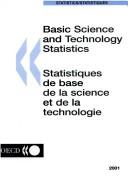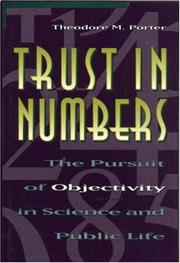| Listing 1 - 2 of 2 |
Sort by
|

ISBN: 9264075496 9264097481 Year: 2002 Publisher: Paris Oecd. (Statistics/Statistiques)
Abstract | Keywords | Export | Availability | Bookmark
 Loading...
Loading...Choose an application
- Reference Manager
- EndNote
- RefWorks (Direct export to RefWorks)
This publication provides recent basic statistics on the resources devoted to R&D in OECD countries. The statistical series are presented for the last seven years for which data are available and cover expenditure by source of funds and type of costs; personnel by occupation and/or level of qualification; both at the national level by performance sector, for enterprises by industry, and for higher education by field of science. The publication also provides information on the output of science and technology (S&T) activities relating to the technology balance of payments.
Science -- Statistics -- Databases. --- Science indicators -- Databases. --- Technology -- Statistics -- Databases. --- Science indicators --- Science --- Technology --- Statistics --- Applied science --- Arts, Useful --- Science, Applied --- Useful arts --- Industrial arts --- Material culture --- Natural science --- Science of science --- Sciences --- Indicators, Science --- Philosophy --- Social aspects --- Natural sciences

ISBN: 0691037760 0691029083 9786612752179 1282752170 1400821614 9781400821617 1400813034 9781400813032 9780691037769 9780691029085 Year: 1995 Publisher: Princeton (N.J.): Princeton university press
Abstract | Keywords | Export | Availability | Bookmark
 Loading...
Loading...Choose an application
- Reference Manager
- EndNote
- RefWorks (Direct export to RefWorks)
This investigation of the overwhelming appeal of quantification in the modern world discusses the development of cultural meanings of objectivity over two centuries. How are we to account for the current prestige and power of quantitative methods? The usual answer is that quantification is seen as desirable in social and economic investigation as a result of its successes in the study of nature. Theodore Porter is not content with this. Why should the kind of success achieved in the study of stars, molecules, or cells be an attractive model for research on human societies? he asks. And, indeed, how should we understand the pervasiveness of quantification in the sciences of nature? In his view, we should look in the reverse direction: comprehending the attractions of quantification in business, government, and social research will teach us something new about its role in psychology, physics, and medicine. Drawing on a wide range of examples from the laboratory and from the worlds of accounting, insurance, cost-benefit analysis, and civil engineering, Porter shows that it is "exactly wrong" to interpret the drive for quantitative rigor as inherent somehow in the activity of science except where political and social pressures force compromise. Instead, quantification grows from attempts to develop a strategy of impersonality in response to pressures from outside. Objectivity derives its impetus from cultural contexts, quantification becoming most important where elites are weak, where private negotiation is suspect, and where trust is in short supply.
Methodology of economics --- Science --- Objectivity. --- Sciences --- Objectivité --- Social aspects. --- Aspect social --- Objectivity --- -sciences sociales --- mathematiques --- statistique --- theories economiques --- secteur public --- Natural science --- Science of science --- Knowledge, Theory of --- Reality --- Personal equation --- Social aspects --- sociale wetenschappen --- wiskunde --- statistiek --- economische theorieen --- openbare sector --- Objectivité --- Science -- Social aspects. --- sciences sociales --- Science and society --- Sociology of science --- Science. --- objektivitet --- presisjon --- nøyaktighet --- tallbegrepet --- filosofi --- samfunn --- samfunnsvitenskap --- kvantifisering --- vitenskap --- sosiale --- aspekter --- kvantiative --- metoder --- kvantitative --- Monograph --- Science - Social aspects. --- SCIENCE --- SOCIAL ASPECTS --- OBJECTIVITY --- Objectivite
| Listing 1 - 2 of 2 |
Sort by
|

 Search
Search Feedback
Feedback About
About Help
Help News
News